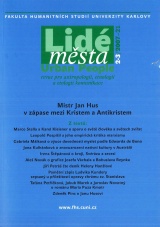Welt, Umwelt, Lebensraum
Uexküll, Lorenz a Gehlen – spor o světě člověka a světech zvířat
DOI:
https://doi.org/10.14712/12128112.3750Abstrakt
Today, we often encounter attempts to overcome the hiatus between natural sciences and humanities. Many speak of a principal impossibility of such a step and point at (maybe even rightly) to the dilettante manner of such attempts. When Charles Percy Snow (1905-1980) in the 1950s took note of the existence of “two cultures”, humanities and natural sciences, he noticed their mutual grudge and unwillingness to communicate that he explained by lack of common language. Since when is this gap evident in western intellectual history? Was Snow’s, almost anthropological, discovery of two science cultures a new reflection of existing phenomenon or was is a brand new condition? We shall show, using a historical example of relationship between three personalities in history of science and philosophy, namely biologist Jakob von Uexküll, philosopher and anthropologist Arnold Gehlen, and etologist Konrad Lorenz, that the first half of the 20th century was a period of agile “inter-cultural” contact in the above mentioned sense. In conclusion of this article, we shall evaluate contributions and negative impacts of this actual contact. One of the topics and at the same time means of this inter-cultural contact was the so called theory of “umwelt” (Umweltlehre) that we shall attempt to examine here as a theme. Additional goal of this article is also to outline attitudes of intellectuals in the first decades of the 20th century regarding the relationship and differences between “humanities” and “natural sciences” of nature and society, human matters on one hand and natural laws on the other. In order to depict the situation of the theory of “umwelt” that in the first decades of the 20th century existed as an autonomous biological-social intellectual tradition, we must at least briefly mention the strong trend in history of European thinking that is, as we shall show, closely related with this topic. This trend is Darwinism, one of the most influential intellectual fashions of the end of 19th and beginning of 20th centuries.
Stahování
Publikováno
Jak citovat
Číslo
Sekce
Licence

Tato práce je licencována pod Mezinárodní licencí Creative Commons Attribution-NonCommercial-NoDerivatives 4.0.


